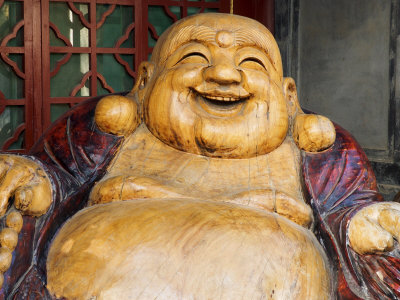Would you describe the attainment of Samadhi as being synonymous with godhood itself, as opposed to worship of God, or do you consider that the concept as divinity is an aberration altogether?
Samadhi deals with one-pointed concentration of mind, achieved by the practioner's own ability. I don't think I would equate it with godhood, but I wouldn't consider the concept of divinity an aberration. To me, divinity deals with higher spiritual truths, but not necessarily with an almighty creator god, which Buddhism would consider to be wrong.
If, in becoming enlightened, one only realises that one was enlightened all along, where then is the baseline, by which you'd personally describe the desirability of becoming enlightened at all, since lack of that awareness is what defined it all along? Or is enlightenment only an awareness that enlightenment means nothing?
The Zen masters would say that enlightenment means both nothing and everything. It's simply the state of being devoid of the three poisons of greed, aversion, and ignorance, as well as the lack of desire or clinging/attachment. I wouldn't say that one should desire to become enlightened, or rather, realize enlightenment, as desiring the goal can actually cause that goal to become a hindrance. As the Zen masters said, in meditation, seek to gain nothing.
What is there in identification with the self and materiality, that is so repugnant to Buddhists? Thralldom, like politics, could only ever be opinion. Should the pleasures of the flesh be so casually cast aside, as being anathema? Even pain and anguish are necessities, and instructional. There is no development without suffering.
The Buddhist problem with the self is that, at least what we think of when we think of 'self', doesn't actually exist. It's not that the Buddhist is repulsed by the idea, we just see it as an illusion. One of the primary Buddhist ideas is that of 'anatta', which means 'not-self'. Western Buddhists have erroneously translated it as 'no-self', meaning that there is not a self at all. Not-self means that there is no such thing as an eternal, independently existing ego-self. What we think of as 'self' is simply the five aggregates: form, feeling, perceptions, mental formations, consciousness, which Buddhism teaches are empty of self-nature, but that it's these which causes clinging, which leads to suffering. Buddhism teaches that suffering is not necessary to existence, but is caused by an improper view of what's real, of what constitutes reality.
Is the path to absorption a form of worship in itself? That of self-worship? If so, is it not counter-intuitive to suggest that enlightenment is anything other than a contradiction in terms, owing to the fact that the self was the only barrier to it? Does one become something other than oneself? Because even superconsciousness presupposes the self as vehicle.
Absorption wouldn't be a form of worship, especially self-worship, as it's a movement towards relinquishing the idea of self. One does not become something other than oneself; one realizes that what they considered the self was just an illusion caused by delusions, and, once those obstacles are removed, all that remains is Buddha-nature. We are all Buddha, part of the eternal oneness of the Buddha-nature, called dharmakaya.
It seems to me that Buddhism is self-glorification, but packaged as something somewhow finer and more noble.
There can be no self-glorification, if there is no self, in the common sense of the word.

Are you yourself enlightened (read as 'aware that you're enlightened' lulz)?
There are three levels to realization: study, where one begins to learn the philosophy of Buddhism; intellectual understanding of the philosophy; and finally full realization. I have an intellectual understanding, but not full realization. So, no, I am not enlightened, or rather, I haven't realized enlightenment. But there are different stages on the path to enlightenment, the number depending on what school you follow. I'm predominantly Soto Zen, which lists five stages on the path to enlightenment, although I would hesitate to answer where I am.

